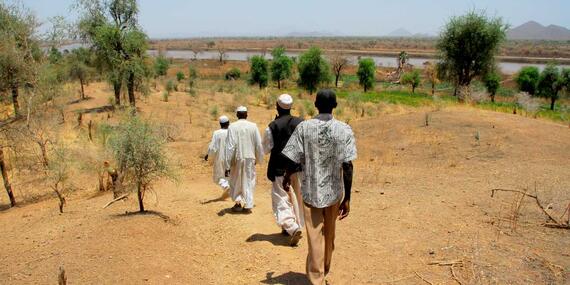Supporting people affected by violence: Hiba’s journey

In July, 28-year-old Hiba* was in her small house in Blue Nile State with her five children and two-year-old grandson. Her husband was working in the fields when fighting between ethnic groups erupted unexpectedly.
Hiba explained: “We heard gunshots outside. We were very scared. We just ran out onto the street trying to escape.”
In Sudan’s Blue Nile State, tensions are increasing between ethnic groups. Issues include land ownership and administrative regulations. However, many people — like Hiba — did not expect the escalation.
“There were some smaller problems before, but we did not expect this,” she said. “We all ran in panic. Then my 15-year-old daughter, Samiya,* and her little son, whom she was carrying, were both hit. They fell. The boy was lying in front of her. I stood next to them and saw them dying on the street. It was terrible.”
Hiba’s face reflects a deep sadness when remembering the situation. Trying to save her other children, she continued running until they reached a military school, where they found protection. But the recent events left her in shock.
“I do not sleep well at night; I wake up a lot. The children also speak every day about what has happened; why people were trying to shoot at us. They ask me where their sister is, where their nephew is. When I say that they died, they don’t believe me.”
Hiba and her children travelled from Blue Nile State to neighbouring Sennar State on foot and by open trucks, reuniting with her husband’s second wife and her children. They consider themselves as one family and are now staying with community members who are hosting them.
“I did not know the people before. They are very kind; they are providing us with shelter and food. We are very grateful.”
She adds: “There is no way for us to go back. Our house was burned down and our things were looted. We don’t have anything left there. Five days ago, we found out that my husband escaped to Khartoum. As soon as I find some money, I will go there.”
Hiba is still in shock about the horrific events. She received medical support through Save the Children’s emergency response centre in Sennar State.
“My young daughter was sick, and we were glad that treatment was provided free of charge here in the centre,” she said. “We are safe now, but our old life is gone. We must rebuild everything from scratch.”
Save the Children staff are doing their best to support people like Hiba through psychosocial support and medical services. The services are funded through the generous support of the UN’s Sudan Humanitarian Fund.
*Names have been changed.
